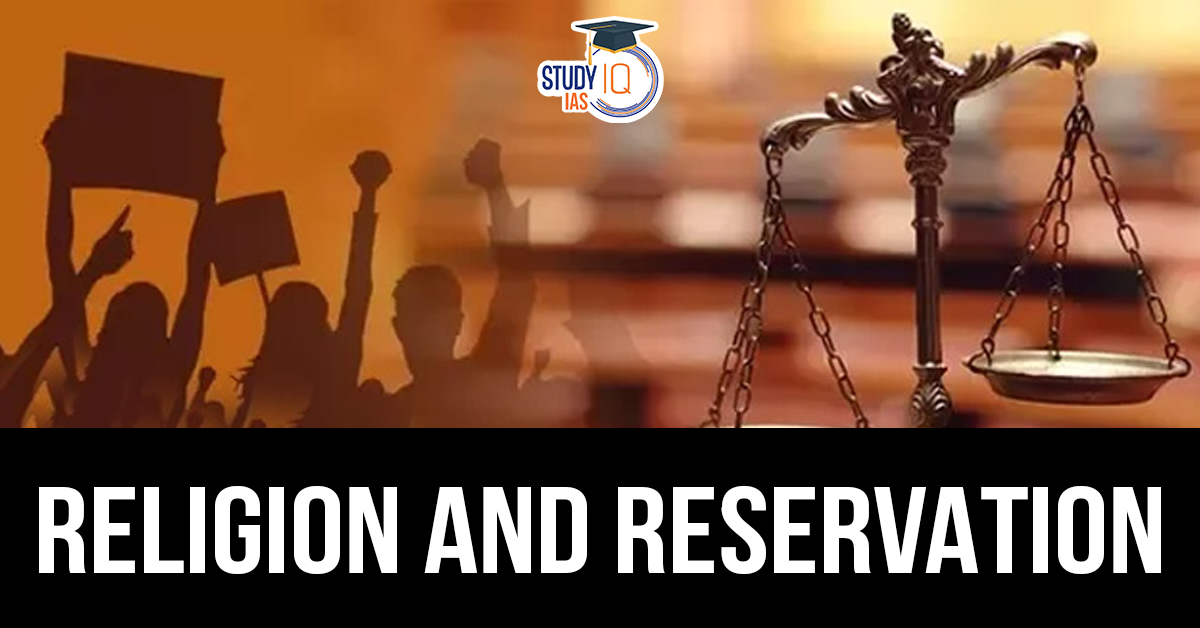Table of Contents
This remark came during the hearing of appeals challenging the Calcutta High Court’s decision to invalidate reservations granted to 77 communities, primarily from the Muslim community, under the Other Backward Classes (OBC) category.
Calcutta High Court Decision (2024)
- On May 22, 2024, the Calcutta High Court struck down OBC reservations for 77 classes, of which 75 were Muslim.
- The court ruled that the reservations were granted without objective criteria to establish backwardness.
- It observed that religion appeared to be the sole basis for identifying these communities as OBCs, violating the principles set forth in the Indra Sawhney case.
Religion as a Criterion for OBC Reservations
Constitutional Framework for Religious Groups in Reservations
- The Constitution does not explicitly prohibit identifying religious groups as beneficiaries of reservations.
- However, such inclusions have primarily occurred within the OBC category.
- Article 16(4) of the Constitution empowers states to provide reservations for “any backward class of citizens” that is inadequately represented in state services.
- Instances of Inclusion:
- Kerala included Muslims within the OBC quota in 1956.
- Karnataka followed in 1995.
- Tamil Nadu extended similar provisions in 2007.
Karnataka and the Role of Backward Classes Commissions
- In Karnataka, OBC reservations for Muslims were introduced based on the Third Backward Classes Commission report (1990), chaired by Justice O. Chinnappa Reddy.
- The report identified Muslims “as a whole” as socially and economically backward.
- The Justice Rajender Sachar Committee report (2006) also highlighted the low representation of Muslim OBCs in Central Government departments.
- It emphasized that the benefits of backward class entitlements had yet to reach Muslim communities.
Indra Sawhney Judgment and Its Significance
- In the landmark case of Indra Sawhney v. Union of India (1992), the Supreme Court clarified the purpose of OBC reservations as addressing historical discrimination.
- Key observations:
- While factors like religion, race, caste, and other group identities could be considered, they cannot be the sole criterion for granting reservations.
- The determination of backwardness must be objective and evidence-based.
Religious Restriction in SC Status
Constitutional Basis for Scheduled Caste (SC) Reservations
- Article 341(1) of the Constitution empowers the President to specify castes, races, or tribes that are to be recognized as Scheduled Castes (SCs).
- Based on this, The Constitution (Scheduled Castes) Order, 1950 was issued, listing SC communities on a state-wise basis.
Religion as a Barrier in SC Reservations
- Clause 3 of the 1950 order restricts SC status to individuals professing Hinduism, Sikhism, or Buddhism.
- Timeline of inclusions:
- Initially, SC benefits were limited to Hindus.
- In 1956, the order was expanded to include Sikh converts.
- In 1990, it was further extended to include Buddhist converts.
Judicial Position: Soosai v. Union of India (1985)
- In the Soosai case, a cobbler from the Adi-Dravida SC community was denied SC benefits after converting to Christianity.
- The Supreme Court observed:
- It did not definitively answer whether a religious convert could retain their caste status post-conversion.
- The Court ruled that proving continued caste-based social handicaps with “oppressive severity” in the new religion was essential to access SC benefits.
Ranganath Mishra Commission Recommendations (2007)
- The Ranganath Mishra Commission (constituted in 2004) found that the caste system transcends religious boundaries and affects all Indian communities, regardless of religion.
- Key Recommendation: A change of religion should not disqualify a person from retaining SC status if they were previously included in the SC list.
- Response: However, the Central Government has rejected these findings in recent years, resulting in periodic halts to efforts aimed at including converts from Christianity and Islam under SC reservations.
Key Constitutional Issues Pending Supreme Court Review
Challenge to the 1950 Scheduled Castes Order
- The constitutional validity of the 1950 Scheduled Castes Order, specifically Clause 3, is under scrutiny in the case of Ghazi Saaduddin v. State of Maharashtra (pending since 2004).
- In 2011, the Supreme Court agreed to examine the constitutionality of Clause 3.
- However, in April 2024, the Court deferred hearings, citing the Centre’s formation of a new commission to review whether religious converts should retain SC status.
The K G Balakrishnan Commission
- The Centre rejected the Ranganath Mishra Commission’s 2007 recommendations, which supported extending SC benefits to religious converts.
- Instead, the government established a new commission, chaired by former Chief Justice of India K G Balakrishnan, to assess the issue.
- The commission has conducted public hearings across states and, in November 2024, received an extension to submit its report by October 2025.
Debate on OBC Reservations for Religious Groups
- The Supreme Court is also addressing whether OBC reservations can be extended to religious groups as a whole.
- Background:
- In 2005, the Andhra Pradesh government introduced a law granting 5% OBC reservations to Muslims.
- The Andhra Pradesh High Court struck down the law the same year, stating the government had failed to apply objective criteria to classify Muslims as a backward class.
- Current Status:
- The Supreme Court indicated it would hear this matter after resolving the challenge to reservations for Economically Weaker Sections (EWS).
- While the EWS decision was delivered on November 7, 2022, there has been no further progress on the OBC reservations for religious groups case.


 New Phase of Operation Chakra to Combat ...
New Phase of Operation Chakra to Combat ...
 Soyuz Aircraft: History, Design and Sign...
Soyuz Aircraft: History, Design and Sign...
 Topological Materials: The Future of Qua...
Topological Materials: The Future of Qua...





















